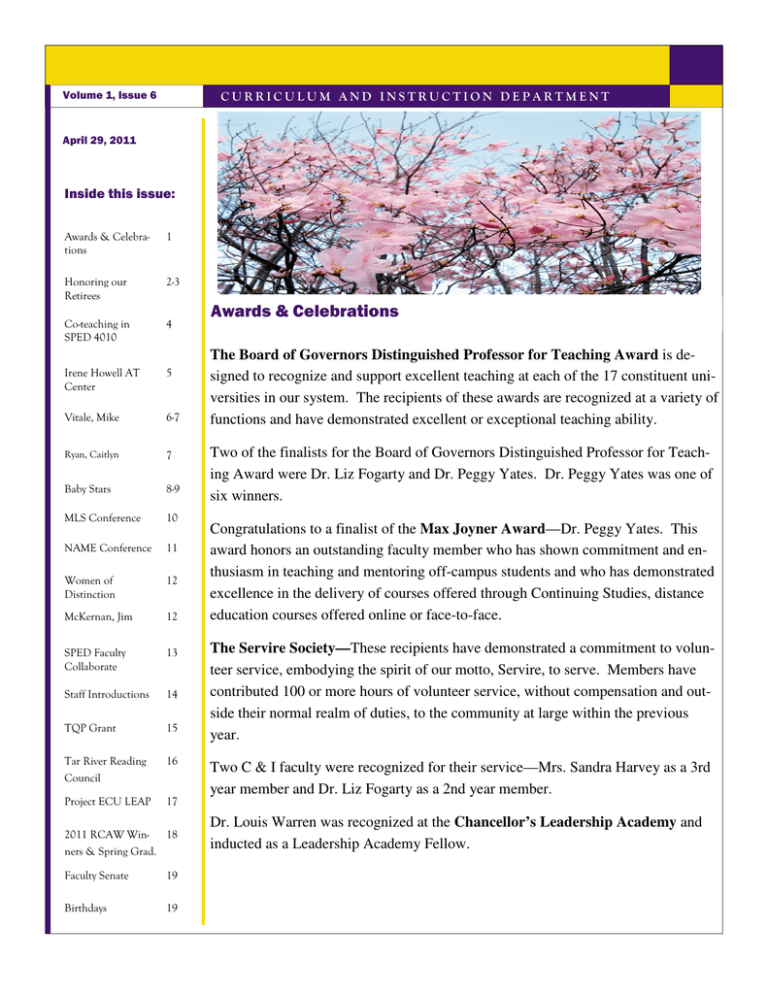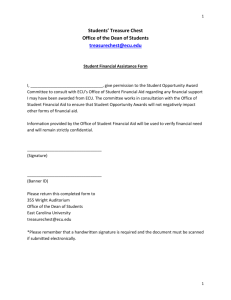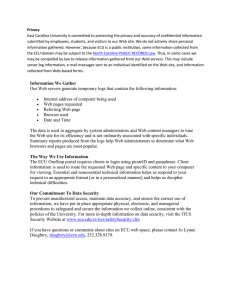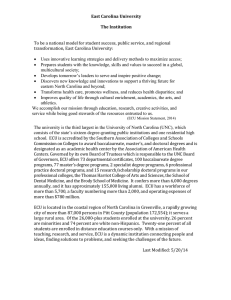CI newsletter vol 1 issue 6 March
advertisement

Volume 1, Issue 6 CURRICULUM AND INSTRUCTION DEPARTMENT April 29, 2011 Inside this issue: Awards & Celebrations 1 Honoring our Retirees 2-3 Co-teaching in SPED 4010 4 Irene Howell AT Center 5 Vitale, Mike 6-7 Ryan, Caitlyn 7 Baby Stars 8-9 MLS Conference 10 NAME Conference 11 Women of Distinction 12 McKernan, Jim 12 SPED Faculty Collaborate 13 Staff Introductions 14 TQP Grant 15 Tar River Reading Council 16 Project ECU LEAP 17 2011 RCAW Win18 ners & Spring Grad. Faculty Senate 19 Birthdays 19 Awards & Celebrations The Board of Governors Distinguished Professor for Teaching Award is designed to recognize and support excellent teaching at each of the 17 constituent universities in our system. The recipients of these awards are recognized at a variety of functions and have demonstrated excellent or exceptional teaching ability. Two of the finalists for the Board of Governors Distinguished Professor for Teaching Award were Dr. Liz Fogarty and Dr. Peggy Yates. Dr. Peggy Yates was one of six winners. Congratulations to a finalist of the Max Joyner Award—Dr. Peggy Yates. This award honors an outstanding faculty member who has shown commitment and enthusiasm in teaching and mentoring off-campus students and who has demonstrated excellence in the delivery of courses offered through Continuing Studies, distance education courses offered online or face-to-face. The Servire Society—These recipients have demonstrated a commitment to volunteer service, embodying the spirit of our motto, Servire, to serve. Members have contributed 100 or more hours of volunteer service, without compensation and outside their normal realm of duties, to the community at large within the previous year. Two C & I faculty were recognized for their service—Mrs. Sandra Harvey as a 3rd year member and Dr. Liz Fogarty as a 2nd year member. Dr. Louis Warren was recognized at the Chancellor’s Leadership Academy and inducted as a Leadership Academy Fellow. Curriculum & Instruction Page 2 Honoring our Retirees Dr. Al Muller Dr. Christine Fitch Dr. Sue Steinweg “I found that there were these incredibly great people at doing certain things, and you couldn't replace one of these people with 50 average people. They could just do stuff that no number of average people could do.” Steve Jobs like Burmese rubies and modeled 21st century skills before there was a name for them. The ease with which he manipulated intellectual cargo alerted you to sluggishness in your own mental operations. He pushed students to passionately and independently make Dr. Christine Fitch and literary expeditions into Dr. Sue Steinweg, two books of merit and grew incredibly great SPED minds that, like Loblolly faculty members are Pines, stretched high to retiring this year. While meet the Sun. Colleagues It does not seem possiwe know we can’t rebenefited from his trustplace them with 50 peo- ble that Professor worthiness and practicalEmeritus Al Muller ple, we also know we ity. While former students could be retiring from can’t make it possible often returned to campus ECU. During his career, for “Muller’s” advice, for them to do the things that they want to he championed the Eng- they did not linger. Only do if we keep them here lish Education program, the ones without pretense the College of Educadoing all of the fabuwere comfortable in his tion, the Department of company. And who, but lous things they do for English, and his stuSPED, C&I, COE, and he, could pull that off? Al ECU! We could devote dents. was and will always be an entire newsletter to Dr. Muller’s class dis- unforgettable. each of them and their cussions on William wonderful characteristics, competencies, and Golding and James contributions -- and still Baldwin featured elecwe could not adequately tric performances, but express how grateful we were never selfare to have them as our aggrandizing. Tight and colleagues and collabo- loose, wise and whimsical, charming and— rators; nor articulate how much we will miss how should we put this? —blunt, he never took them personally and himself too seriously. professionally. He treated good ideas Christine and Sue – The Special Education faculty and students have been enriched by the opportunity to work with and learn from both of you and the program is immeasurably better because of your contributions! Thank you! Godspeed! We are proud and grateful for the opportunity to know and work with both of you! Volume 1, Issue 6 Page 3 Honoring our Retirees How Many Hats Can One Pirate Wear? . None can ever accuse her of being quite bored, Not the infamous Pirate, known as Beth Ward! She always has multiple irons in the fire… A trait we all can certainly admire! First she’s a wonderful family girlHusband, kids and grandkids are the center of her world. She’s also a Pirate, through and through, To her purple and gold, she will always be true! “Let no one ever come to you without leaving better and happier. Be the living expression of kindness in your face, kindness in your eyes, kindness in your smile.” ~Mother Teresa Principal, professor, loves to teach Never met a student she didn’t try to reach. Being County Commissioner she also enjoys…. Better known as “Beth, and the Good Old Boys!” Her connections are vast, they never quitShe knows or is kin to all the county of Pitt! Her attire is all matched from her head to her feetA more coordinated lady you never will meet! She’s quiet, reserved and has a shy demeanor…. You know that’s a lie if you’ve ever seen her! She is truly vivacious, outgoing and smartAlways smiling, laughing and sharing her heart. Mrs. Beth Ward To our colleague- whatever your future endeavors, ELEM will be your home and we’re your friends forever! Lisa Curriculum & Instruction Page 4 Co-Teaching in SPED 4010 Marsha Tripp and John Smith have been co-teaching two sections of SPED 4010 for three continuous semesters. This is a course for all non-special education majors in inclusive education. They teach and model the six coteaching strategies as researched by Marilyn Friend which include: One-Teach, One Observe Team Teaching Parallel Teaching Station Teaching Alternative Teaching One-Teach, One Assist At the end of each class, the students identify and discuss the co-teaching strategies that were modeled by their instructors. The students are also assigned a peer-buddy. With their buddy, they have to present an effective teaching strategy such as scaffolding, cooperative learning, use of graphic organizers, task analysis etc. They present the strategy using a co-teaching model and then the students have to engage in an activity using the strategy presented. This gives the students hands-on experience in both the coteaching model as well as a research based strategy. The TQP strategies are being incorporated in our teaching as well Marzano’s levels of thinking to include: Present: (Knowing) the strategy Model: (Applying) the strategy throughout the semester Demonstration: (Integration) opportunities for student demonstration in class Volume 1, Issue 6 Page 5 April News from Irene Howell Assistive Technology Center *We entered into a university-vendor partnership with Slater Software, who produces Pixwriter and Picture It, where they donate 29 out of 30 licenses (an in-kind donation of about $11,324), provide ongoing training for our faculty and students through on-demand webinars and occasional donations of other software. *At a recent conference, the Marblesoft/Simtech company donated their entire software line, with permission to run it on all machines for a total in-kind contribution of $6870 *Melissa Engleman became a certified VizZle trainer, and the Monarch Company has entered into a university-vendor partnership with us, providing faculty accounts at no cost (usual cost is $750/license), student semesterware, and significant discounts to our graduates. This amounts to an in-kind contribution of over $7500. *In April, over 120 students came in for software evaluations and to learn about assistive technology from SPED 2000 Intro to Special Education. *Lindsay Stump presented on how to make e-Books for a class of 31 students from CDFR department. *Sandy Boccio, Smart Notebook Software certified trainer, presented a sixweek series of training events for faculty in the Assistive Technology Center. *Melissa Engleman began a six-week training series for special education faculty on new items in the AT Center. The same series will be repeated, and opened up to C&I Faculty *Sarah Hara began running a single subject study using the b-Calm device with a child who has autism. *Anna Strickland began a study in her classroom on the TAP-It device, comparing it with other interactive whiteboard use. Curriculum & Instruction Page 6 Michael Vitale, Professor of Research Dr. Vitale’s professional initiatives across the past year include a mixture of teaching, research and service. Teaching Initiatives As a major teaching initiative, Dr.Vitale has implemented a series of design enhancements to his distance learning, Masters-level Introductory Research course. Most researchers believe that actively involving graduate students in apprenticeship experiences is the best way for them to gain knowledge of research concepts and an understanding of research in their field of interest. In contrast, within a distance learning setting (vs. face-to-face instruction), research courses based on encyclopedic research textbooks fall short of developing such a meaningful understanding of research concepts by students. In contrast to a textbook-oriented course, the enhanced design of the Introductory Research course identifies and involves students in a set of logistically-efficient activities/ assignments they would experience if they were engaged in an apprenticeship experience (e.g., analysis of published research in terms of classroom applications, identification of possible future “in-field” research studies based on a limited literature review on student-selected topics, identification of a topic of interest and completion of a miniresearch study, development of a detailed research proposal that - as an enhancement of a published study - could result in a published research study, methodological critique of issues identified in the research literature). As a critical complement, students gain an understanding of the core research concepts that provide a foundation for the apprenticeship-oriented course activities through a set of focus questions and focus question discussions (framed as answers). In completing all assignments, students work in collaborative groups through which the course structure encourages extensive peer discussion. Finally, to insure individual student understanding of research concepts, mastery of course-developed, criterion-referenced tests is required of students. Based on overall quality of student work, student test performance, and positive student feedback, the versions of the course implemented during the present academic year have been very successful. Research Initiatives Research initiatives for the past year have focused on several activities. The first is the completion of a multi-year NSF-funded project investigating the effects of a grade 3-5 in-depth science model that replaces traditional reading/language arts on student achievement in reading comprehension and science. This project showed not only that students involved in using the model obtained greater levels of achievement in reading and science in grades 3-5; but also that these effects transferred to grade 6-8 in a manner that increased with grade level. In addition, the model was successfully adapted for use in grades K-2 and shown effective in accelerating student achievement in reading and science as well. Present project activities consist of additional cohort-oriented data analysis, completion of the project web-page, and manuscript development for publication. Volume 1, Issue 6 Page 7 Michael Vitale, Professor of Research—cont. The second research initiative has been the implementation and testing of a cognitivescience-oriented, inductive vocabulary development model as a means of accelerating student vocabulary development and reading comprehension. Based on an underlying concept of latent semantic analysis, teachers guide students in the structured, multiple substitution and interpretation of semantic word-families in traditional basal reading stories. In the model, the use of semantic word families is designed to enhance vocabulary on nationally-normed and project-developed tests while the implicit requirement of students having to understand the story passages to engage in vocabulary substitution tasks is designed to build reading comprehension proficiency. Preliminary findings are consistent with the intervention design. The third research initiative is the design and initiation of a cognitive-science-oriented textbook for teachers that focuses on content-area instruction. The design of the book is based on two perspectives: (a) consensus interdisciplinary research on meaningful learning and (b) a practical instructional systems approach that is intended to present the academic principles identified in research in a form usable by teachers in classroom settings. Service At the national level, Dr. Vitale is serving as (a) a member of the Policy Committee for the National Association for Research in Science Teaching, (b) Associate Editor of the Journal of Direct Instruction, and (c) a reviewer for the International Journal of Science and Mathematics. In addition, he has provided leadership and support to a number of schools in the area of reading and science instruction, including the design of a K-5 science-mathematics magnet school. Dr. Caitlyn Ryan Publications One recent publication: Enciso, P. & Ryan, C. (2011) Sociocultural theory: Expanding the aims and practices of language arts education. In D. Fisher and D. Lapp (Eds.), Handbook of research on teaching the English language arts (3rd edition), pp. 119-138. New York: Routledge. One recent conference presentation: Ryan, C. (2011, February). Moving Beyond the In-School/Out-of-School Binary: The Power of Multi-Site Ethnography in Literacy Research. Paper presented at the National Council of Teachers of English Assembly for Research Conference in Madison, WI. Curriculum & Instruction Page 8 Congratulations to Dr. Ran Hu Baby Ellie was born at 5:56 a.m. on April 26. She weighed 8 pounds 9 ounces, and is 19 1/2 inches long. Both Ran and baby are doing well. Dad is all smiles. Ellie's big brother Danny is thrilled with his little sister! Ran and her husband Hui Yang live at 2800 Royal Drive, Winterville, NC 28590. They expect to return home Thursday morning (yesterday). Welcome, Baby Ellie! Congratulations to Dr. Sandra Warren Jude Thomas Carraway Warren joined our world in person at 11:57 p.m. on Saturday, April 9th. Congratulations to Dr. Sandra Warren on her first grandbaby! Dr. Warren will have to send us all some pictures of her grandson. Welcome, Baby Jude! Volume 1, Issue 6 Page 9 Dr. Nancy Zeller, Professor & Area Coordinator of Research Fig. 1 – Bigger Head at 3 Weeks Fig. 2 – Smaller Head at 2 ½ Months Latest Findings Reveal Zeller Heir May Have Shrinking Head Dr. Zeller’s grandson, Jackson Aris Zeller, now 3 months old, is outperforming other children his age: his weight and height place him in the 97th percentile of all humans in his natal cohort. However, it has been found that young Zeller’s cranial circumference is only in the 70th percentile (while at birth it was in the 95 percentile). So in proportion to the rest of his body, Jackson’s head is shrinking! Observe Figures 1 and 2. When a caretaker attempted to place young Zeller in his father’s christening outfit at three weeks, the best result that could be obtained, due to the enormous head, was to lay it over his upper torso. By 2½ months, the cranium was markedly smaller. Dr. Zeller reminds her C & I colleagues that more data need to be collected to confirm her hypothesis. Young Zeller’s parents are quite concerned because—other than his dwindling cranium, the child has met their expectations. Remarkably, a possible cause has come to light: several observers have noted that young Zeller seeks nutrition at all times of the day (and night). As a result, Dr. Zeller (formerly one of the nutrient providers) proposed a Single Subject ABA design, involving nutrient intake reduction, in hopes of reallocating development from Jackson’s mushrooming body to his diminishing cranium. Regrettably, young Zeller’s parents were less than enthusiastic about the proposed experiment and refused to sign the IRB Consent Form for Research on Human Subjects. Results were to have been reported in a highly anticipated article in the Journal of Irreproducible Results or in the Annals of Improbable Research (AIR). This setback in her research agenda has been a shock to Dr. Zeller’s post-tenure review hopes. Researcher with Subject Prior to Cranium Crisis Curriculum & Instruction Page 10 Mary Lois Staton Reading/Language Arts Conference – February 7, 2011 Dr. June Atkinson, North Carolina State Superintendent of Public Instruction, served as the keynote speaker of the 29th annual Mary Lois Staton Reading/Language Arts Conference held at the Murphy Center on the campus of East Carolina University. She addressed elementary, middle and high school teachers as well as administrators, university faculty, and many pre-service teachers. Her presentation focused on the Common Core Standards that North Carolina and 46 other states are in the process of adopting and implementing by 2012-2013. Dr. Atkinson emphasized that improving North Carolina’s graduation rates is dependent on having essential standards in place along with appropriate assessment and accountability. She compared the standards to a GPS that guides teachers and students through varied delivery formats including face to face and virtual. Dr. Atkinson is hopeful that these standards will increase our state’s graduation rates. In addition to Dr. Atkinson’s presentation on the Common Core Standards, many other breakout sessions on literacy topics were offered throughout the afternoon. The presentations were made by university faculty and classroom teachers. Continuing Education Units were offered for their attendance. This conference is sponsored each year by the Department of Curriculum and Instruction in the College of Education. The late Mary Lois Staton, who died in 2002, was a professor of education at ECU for 27 years. She founded the conference to provide educators an opportunity for ongoing professional education. Volume 1, Issue 6 Page 11 National Association of Multicultural Education Collaborative symposium at the National Association for Multicultural Education (NAME) Conference at the University of Missouri, Kansas City, April 2, 2011. The symposium title was: MULTI-State University Collaboration: Responding to the Professional Development Needs of Teachers of English Language Learners. Description: This symposium presents the preliminary outcomes of a 5-year innovative collaboration among five universities in multiple states on concept knowledge and strategies needed to address the differentiated needs of culturally and linguistically diverse (CLD) students through coherent and sustained professional development. Project ECU LEAP participated with (from left to right): Dr. Jane Manner (East Carolina University - Project ECU LEAP), Dr. Joan Nielson (Morningside College - Iowa), Dr. Janet Penner-Williams (U. of Arkansas), Dr. Socorro Herrera (Kansas State University - Center for Intercultural and Multilingual Advocacy) Curriculum & Instruction Page 12 100 Years Back/100 Days Forward A Reception was held in Honor of the 2011 Women of Distinction On Wednesday, April 13, 2011 The Chancellor’s Committee on the Status of Women, selected Dr. Diane Rodriguez as a 2011 Woman of Distinction - Congratulations! They received 42 nominations in all, representing ECU faculty and staff in all schools and at all levels. Every one of the women nominated personifies dedication, leadership, involvement, and hard work. They were awed by Diane’s accomplishments and proud that she represents ECU. Dr. Jim McKernan—presentation One recent conference presentation: McKernan, Jim (2011, February). He gave a research paper titled “Theodore Brameld: Reconstructionism, Socialism and Philosophy of Education” at the 63rd Annual Meeting of the Southeast Philosophy of Education Society, Decatur, Georgia, February 18th, 2011. Volume 1, Issue 6 Page 13 SPED Faculty Collaboration: Recent Publications Jennifer Williams, Chan Evans, and Debbie Metcalf Evans, C., Williams, J. B., & Metcalf, D. (2010). Using high- and low-technology tools to enhance self- and peer-assessment and feedback for preservice teachers. Journal of Special Education Technology, 25(4), 55-60. Abstract: This Content Area Applications article describes a pilot project designed to improve and increase effective teacher behaviors of preservice special educators. Fourteen juniors participated in the Teach-Assess-Reflect (T-A-R) project. First, dyads used Flip cameras to record each other teaching direct instruction lessons in their elementary school practicum setting. Then, during in-class seminars, they viewed each video and used a two-page form to record frequency data for target behaviors, reflect individually, and share their reflections with peer partners. This use of high-tech and low-tech equipment and materials helped guide students’ development and professional growth, as some of the responsibility for assessment and feedback was shifted from instructormediation to self- and peer-mediation Williams, J. B., Evans, C., & Metcalf, D. (2010). Team teaching: A collaborative approach to effective online instruction. National Teacher Education Journal, 3(3), 33-38. ———————————————————————————————————Abstract: This article describes team teaching in an online special education course at East Carolina University. In order to address some of the instructional challenges of the virtual format (e.g., time demands, isolation, lack of collaboration), an effective face-toface team teaching model was applied in which two instructors (a) planned together, (b) delivered instruction together, and (c) evaluated the learning experience of students together. Perspectives of both instructors and their preservice special education teachers are discussed, including advantages and disadvantages of the online teaching and learning experience. Curriculum & Instruction Page 14 New Staff Member-Ms. Sandy Boccio Sandra's quest out of high school was to learn how to fly. This goal led her to where she earned her Private Pilot's license certified to fly single engine aircraft. With this dream fulfilled and a primary goal accomplished she then redirected her focus to Information Technology where she continues to be motivated by challenges. Sandra is an IBM Certified Lotus Professional, bringing 15+ years of technical experience. She became interested in Assistive Technology in response to her stepdaughter's cognitive learning disability who has struggled with reading, comprehension and math since the 3rd grade. Sandra’s Mom, who is legally blind, struggles with macular degeneration and is also hearing impaired. Sandra came to the Irene Howell Assistive Technology Center one year ago, as a volunteer, after attending the North Carolina Assistive Technology Professionals (NCATP's) 19th annual AT Expo(NCATP's) 19th annual AT Expo in Raleigh. She was fascinated by the scope of it all and eager to learn everything possible about this area of technology. She is actionoriented, precise and tireless. Sandra recently earned her certification with SMART Technologies as a “SMART Certified Trainer” and will be presenting this technology to SPED faculty during the upcoming “SMART Training Workshop for Smart Board Interactive Whiteboards”. Assistive Technology is on the move at East Carolina University! New Advisor—LaShica Davis Ms. LaShica Davis is an academic advisor in the College of Education Advising Center. She advises Elementary, English, History and Middle Grades Education majors. With a background in Admissions, her interests include recruitment of minority and first generation students along with inclusion, student outreach and retention of all students. She takes interest in programming and events that cultivate diversity in education and the collegiate experience and has planned Multicultural Family Day, an event for prospective students, for the past 5 years. She teaches two sections of COAD 1000, a course . specifically designed to enhance student development and learning in higher education for incoming freshmen. Degrees She is also the advisor for E.D.U.C.A.T.E., the COE student organization for minority pre-service educators which fosters personal and professional leadership growth, provides opportunities to explore many aspects of the multicultural experience as part of a community of learners, and enhances academic support of its members through advocacy and resources. M.S. Counselor Education (Higher Education), East Carolina University B.A. Communication (Public Relations), East Carolina University Minor Speech and Hearing Sciences Areas of Interest • Diversity • First Generation Students • Retention of Students • Student Outreach E-mail & Website Links davislas@ecu.edu Volume 1, Issue 6 Page 15 Teacher Quality Partnership Grant Year two of the Teacher Quality Partnership Grant (TQP) brings on board our second school district partner, Greene County Public Schools (GCS). Greene County Schools is a rural, high-poverty, majority-minority district. In 2003 the district embarked on a school reform initiative focusing on literacy, comprehensive counseling/college access, and technology integration. Since that time its one-to-one technology initiative (iTECH) has flourished as a result of balancing infrastructure, content and professional development. The iTECH initiative strives to deliver a rigorous, relevant curriculum to all students and has strategically placed a core of well trained personnel throughout the system to provide for the ongoing needs of its teaching ranks and to insure that the full range of benefits are derived from the technology that is available. Both students and staff use technology as a part of the daily instructional process. While the TQP grant will focus on Pitt County Schools’ introduction of instructional coaches as a part of their school reform efforts, the grant will focus on Greene County Schools’ inclusion of technology facilitators. Currently, technology facilitators are housed in each school site and work directly with literacy facilitators (K-5) to provide integrated targeted support for classroom teachers, students and parents in the community. TQP will hire GCS technology facilitators to work between the school district and the university. During the remaining years of the grant, we will use our work together to best prepare our teacher education students for the 21st century learners they will face in their classrooms. Curriculum & Instruction Page 16 Tar River Reading Council—February 17th Approximately 25 area educators attended the February 17th meeting of the Tar River Reading Council at Wintergreen Primary School. Dr. Jeanne Swafford of the University of North Carolina Wilmington shared a wealth of teaching ideas related to read alouds and web resources. Book talks, author readings of books, and informational videos are just a few ideas that revealed the ways the Internet can be used to enhance and extend liter- acy experiences. For example, showing the actual news footage of Philippe Petit crossing the wire between New York City’s twin towers can enhance the reading of The Man Who Walked Between the Towers. Dr. Caitlin Ryan was the featured speaker at Creekside Elementary School on April 14th and featured a workshop on multicultural literature. Visit us on Facebook: http:// www.facebook.com/#!/ pages/Tar-River-Reading -Council/181816554305 and contact Elizabeth Swaggerty with questions: swaggertye@ecu.edu. Page 17 Project ECU LEAP Project ECU LEAP (Leading Exceptional Annual Progress) had three presentations at NABE 2011 (National Association for Bilingual Education) in New Orleans this year. Each presentation showcased the work of our graduate students in TESL, including teachers from our cohorts in both Pitt and Lenoir Counties. They were as follows: 1. ENGLISH LANGUAGE LEARNERS IN RURAL SCHOOLS: DESIGNING AND DELIVERING INSTRUCTION Dr. Diane Rodriguez, Dr. Jane Manner, Wendy Piro, Yvonne Hardy, Maria Delgado (Lenoir County Schools) 2. USING THINKING MAPS TO IMPROVE WRITING PROFICIENCY FOR ELLs Patty Burke, Dolly Hathaway, Amanda Amante (Pitt County Schools) 3. ENGAGING AND EFFECTIVE LEARNING STRATEGIES FOR ENGLISH LANGUAGE LEARNERS Amanda Brewington, Carolina Herrera, Candice Wade (Pitt County Schools) The sessions were very well attended, and our graduate students did an outstanding job presenting their work and research. This photo is of Dolly Hathaway, Patty Burke, and Amanda Amante (Pitt County Teachers and Project ECU LEAP participants). Maria Delgado & Wendy Piro from Lenoir County. Curriculum & Instruction Page 18 2011 RCAW Winners—Graduate Presentation Winners Graduate Oral Education Student and Graduate Program Thea Johnson, MA Education Mentor & Dept. College Elizabeth Swaggerty, Ed./COE Undergraduate Poster Student & Major Mentor & Dept. College Humanities & Ed. Heather Ayers, C & I Sharilyn Steadman, C&I/COE Spring Graduation Friday May 6, 2011 University Commencement Ficklen Stadium rain or shine processional starting at 9:00 am, ceremony beginning with the arrival of the Platform Party on stage. Friday May 6, 2011 at 5:00 pm the College of Education graduation ceremony will be held in Minges Coliseum. Volume 1, Issue 6 Page 19 Congratulations to the following faculty who have been elected as Faculty Senators for the College of Education, beginning on April 26, 2011. Faculty Senators Patricia Poczontek Dept. of Curriculum and Instruction College of Education Speight 119 Phone: 252-328-6833 E-mail: poczontekp@ecu.edu Patricia Anderson Cheryl McFadden Alternate Faculty Senators Ruth (Chan) Evans Lora Lee Smith-Canter We’re on the Web! http://www.ecu.edu/cseduc/ci/Index.cfm Faculty and Staff Birthdays for March, April & May March April Sandra Harvey—2nd Katherine Misulis-4th Karen Voytecki — 12th Jane Manner—29th Laura King—13th Dawn Shelton—25th May Roxene Barrett—20th Dorothy Muller-31st LaShica Davis– May 21st Sharon Schlicting—22nd Elizabeth Swaggerty—22nd Peggy Yates—31st Michael Vitale—22nd Melissa Engleman—24th Lora Smith–Canter—24tth




